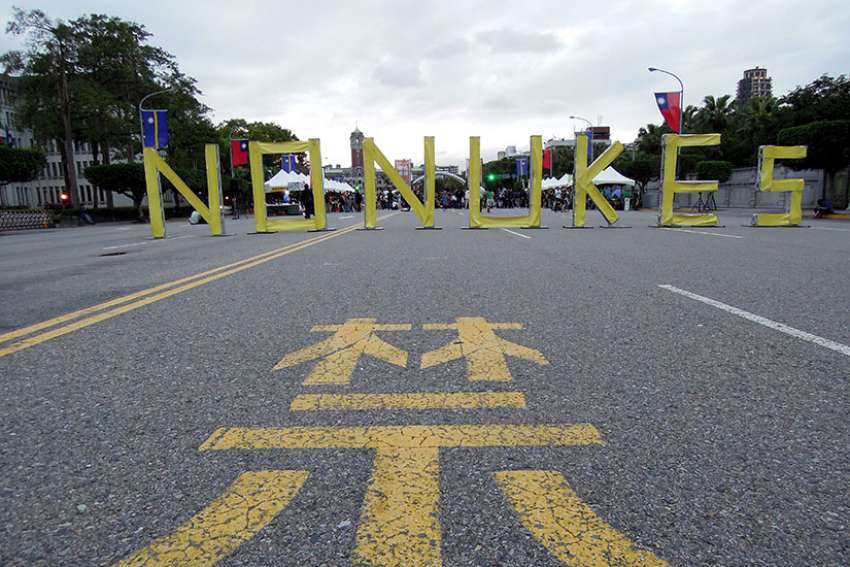Even with such a pact – years in the making – there is no timeline for total disarmament, arms control experts told Catholic News Service.
The real work ahead under the treaty, said Marie Dennis, co-president of Pax Christi International, is getting the world's nuclear-weapons possessing countries and dozens more that fall under the so-called "nuclear umbrella" to take seriously the call to reduce and eventually rid the world of ballistic arsenals.
"It's really phenomenal that it happened," Dennis said of the July 7 vote at the U.N. "It fills a gap in international law and agreements that was pretty huge, that every other weapon of such destructive capacity has been made illegal. As some said, 'These weapons have always been immoral. Now at least they are illegal.'"
The final tally saw 122 nations voting for the ban. Netherlands voted no and Singapore abstained in the final count.
Not present during the voting were the nuclear weapon states of the United States, Russia, China, France, United Kingdom, Pakistan and India as well as numerous countries falling under the nuclear umbrella. The U.N. has 195 member states.
Israel, which many arms control observers believe possesses nuclear weapons, and North Korea, which has tested such weapons but is believed to have not put them in operation, also did not vote.
The U.S. and most European nations have sat on the sidelines during the U.N. meetings discussing a weapons ban. They have preferred to focus on the need for broader security measures to allow for strategic stability on the road to verifiable reductions in nuclear arsenals. In all, about 40 nations boycotted the negotiations. Most nations continue to support the Non-Proliferation Treaty to prevent the spread of nuclear weapons and weapons technology.
Individual nations now must sign the treaty for it to go into effect.
Daryl Kimball, executive director of the Arms Control Association, said not having the nuclear weapons states on board poses a challenge to achieving the goal of total disarmament.
"We think this is overall an important contribution to the efforts to reduce the salience of nuclear weapons as tools of military and foreign policy," he told CNS July 10. "It is an expression of the deep frustration of the non-nuclear weapon state majority that there has not been enough progress by the nuclear weapon states to meet the disarmament commitments."
The Vatican played a key role in the U.N. negotiations on the treaty, which opened in March. Archbishop Bernardito Auza, the Vatican's permanent observer to the United Nations, said the Holy See "actively participated" in preparatory meetings and during treaty talks.
In a rare action, the United Nations allowed the Holy See and Palestine, as permanent observer states, to vote on the treaty. Both voted in favour of the pact.
Archbishop Auza called the treaty's adoption "a very significant first step toward a world without nuclear weapons," in an email to CNS. "While it's importance and impact is obviously tempered by the absence – and in some cases, very vocal and strong opposition – of the nuclear weapons states, the NATO member countries ... and other countries that enjoy the nuclear umbrella ... the achievement cannot be underestimated, much less dismissed.
"It is a clear expression of a 'moral majority' among countries in the world, countries that say 'no' not only to the possession and use of nuclear weapons, but commit themselves never to develop nuclear technology," the archbishop wrote.
The day before the treaty vote, a joint declaration from the U.S. Conference of Catholic Bishops and the Conference of European Justice and Peace Commissions called upon the U.S. and European nations to work with other nations to "map out a credible, verifiable and enforceable strategy for the total elimination of nuclear weapons."
The declaration was signed by Bishop Oscar Cantu of Las Cruces, New Mexico, chairman of the USCCB Committee on International Justice and Peace, and Archbishop Jean-Claude Hollerich of Luxembourg, president of the Conference of European Justice and Peace Commissions.
It acknowledged that nuclear weapon states have been spending billions of dollars to modernize their nuclear arsenals. "These costly programs will divert enormous resources from other pressing needs that build security," it said.
"The fact that most of the world's nations are participating in this effort testifies to the urgency of their concern, an urgency intensified by the prospect of nuclear terrorism and proliferation, and to the inequality and dissatisfaction of non-nuclear states about the lack of progress in nuclear disarmament," the statement said.
The declaration cited Pope Francis, who during his papacy has repeatedly called for the elimination of nuclear weapons, most recently in a message to the United Nations' opening conference on a treaty to ban such weapons in March.
Despite the widespread support for the treaty among U.N. members, citizen concern about nuclear war today pales when compared with the massive uprisings around the world in the 1980s to oppose the U.S. arms buildup to counter the former Soviet Union's long-standing advantage in personnel and non-nuclear equipment. The unexpected outcry influenced President Ronald Reagan so much that he reversed his stance and negotiated treaties with the Soviets to cap nuclear stockpiles.
The most recent arms control pact, New START negotiated in 2010, calls for both countries to reduce their strategic arsenals – weapons deployed on long-range missiles, bombers and submarines – to 1,550 each. Both sides have nearly reached those levels.


